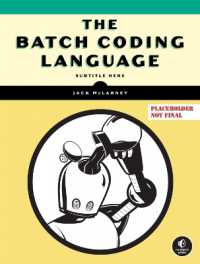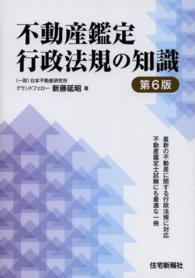- ホーム
- > 洋書
- > 英文書
- > Philosophy
Full Description
Philosophising, as Spinoza conceives it, is the project of learning to live joyfully. Yet this is also a matter of learning to live together, and the surest manifestation of philosophical insight is the capacity to sustain a harmonious way of life.
Here, Susan James defends this overall interpretation of Spinoza's philosophy and explores its bearing on contemporary philosophical debates about issues such as religious toleration, how we use our knowledge, and the environmental emergency. Part I focuses on Spinoza's epistemology. Philosophical understanding empowers us by giving us access to truths about the world and ourselves, and by motivating us to act on them. It gives us reasons for living together and enhances our ability to cooperate. Part II takes up Spinoza's claim that, to cultivate this kind of understanding, we need to live in political communities. It explores his analysis of how states can develop a co-operative ethos. Finally, living joyfully compels us to look beyond the state to our relationship with the rest of nature. The concluding section of this book focuses on some of the overarching virtues this requires.
Contents
Introduction: Philosophy as the Art of Living Together
Part I. Learning to Live Together
Creating Rational Understanding: Spinoza as a Social Epistemologist
When Does Truth Matter? The Relation Between Theology and Philosophy
Spinoza on Superstition: Coming to Terms with Fear
Narrative as a Means to Freedom: Spinoza on the Uses of Imagination
Responding Emotionally to Fiction: A Spinozist Approach
Part II. The Politics of Living Together
Law and Sovereignty in Spinoza's Politics
Natural Rights as Powers to Act
Democracy and the Good Life in Spinoza's Philosophy
Freedom, Slavery and the Passions
Freedom of Conscience and Civic Peace: Spinoza on Piety
Part III. Philosophical Communities
Freedom and Nature: A Spinozist Invitation
The Affective Cost of Philosophical Self-Transformation
Fortitude: Living in the Light of our Knowledge








